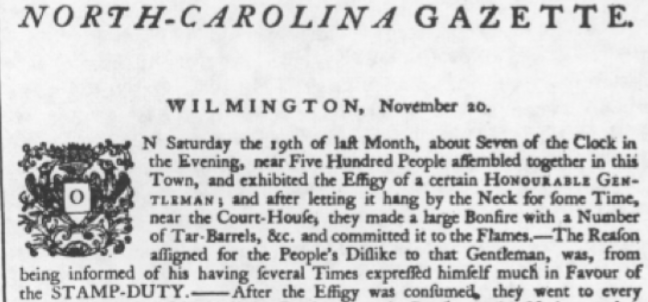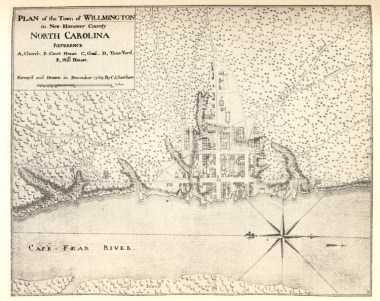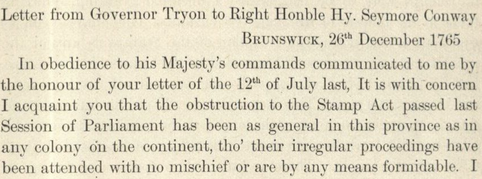Research by Tia Bristoe, Sarah Wicker, and Bradley Owen
1. North Carolina Gazette, November 20, 1765
This document describes the protests against the Stamp Act in Wilmington, NC. While many cities throughout North Carolina protested the Act, the mob actions in Wilmington were the largest. Large crowds assembled and burned supporters of the Stamp Act in effigy and forced the stamp collector, William Houston, to resign his post.

To view the complete account, click here.
2. North Carolina Gazette, November 27, 1765
This article from the North-Carolina Gazette documents a meeting with William Tryon, who was the governor at the time, about the Stamp Act. It anouces William Houston as the Distributor of the Stamps for the State of North Carolina and explains how following the Stamp Act and supporting it by keeping up trade and import would be good for the colony. This article allows us to see the opinions of the tax from very important state government figures.
To view the document, click here.
3. Report re: the ships Dobbs and Patience in Cape Fear, February 3, 1766

This report by Robert Jones concerns two ships in the Cape Fear region, the Dobbs and the Patience. They were taken because they had improper papers, that had no stamps. They were seized by Captain Lobb, he took control of the ships due to them not having the proper clearance to be sailing. They were seized in Cape Fear, and shortly after these ships were taken under the control of Captain Lobb protests organized by the Sons of Liberty broke out.
To read the document, click here.
4. Letter from Governor Tryon to Henry Seymore Conway, December 26, 1765

This is a letter from Governor Tyron describing how the uproar of opposition to Stamp Act was becoming more frequent. He explains what happened to stamp distributor William Houston and describes his resignation. Later in the letter, he expresses his concern with how this could have a negative long-term effect on the colonies.
To read the complete letter, click here.